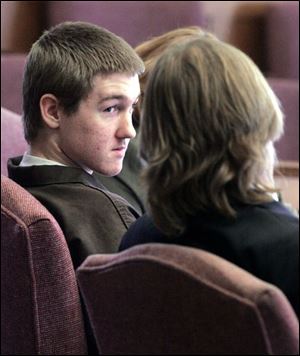
Jobe judge sets Oct. ruling on police interview
8/28/2007
Robert Jobe listens to the proceedings in court yesterday.
A Lucas County common pleas judge will decide Oct. 4 whether statements Robert Jobe made to Toledo police after he was arrested for the murder of an undercover detective will be admissible at the youth's trial.
Judge Charles Doneghy heard more testimony yesterday during a hearing on a motion to suppress statements made by Robert Jobe, the North Toledo teen charged with the Feb. 21 shooting death of vice Detective Keith Dressel.
The judge asked defense attorneys and prosecutors to submit their arguments in writing and promised a decision early in October.
Outside the courtroom, Assistant County Prosecutor Dean Mandros said it is the state's burden to prove police acted appropriately while interviewing the 15-year-old.
"We have to show he waived his rights under Miranda and he did so knowingly, willingly, and intelligently," he said, adding that if Judge Doneghy agrees, the statements could be admitted during trial.
The hearing was a continuation from Thursday when the teen's mother, Diane, testified about her interaction with police officers before she was able to see her son. She said officers told her to speak to her son and suggested she persuade him to cooperate.
Defense attorneys suggested during the questioning of both Ms. Jobe and detectives that investigators used the teen's mother to coerce a statement from her son.
David Klucas, an attorney for the teen, also questioned detectives about how many times the Jobe youth asked for an attorney before his mother was brought in to see him.
In the motion to suppress, Mr. Klucas and Ann Baronas, another defense attorney, argued that the teen asked for an attorney "no less than four times" and was never provided one.
Mr. Mandros said yesterday although police are expected to stop questioning suspects after they request a lawyer, it is up to a judge to appoint one. He said suspects have the right to say they don't want to talk to police, and have the right to change their minds.
Mr. Klucas said the arguments to suppress the statements will be outlined in the memorandum, which is due to the judge by Sept. 14. Prosecutors have an extra week to respond in writing.